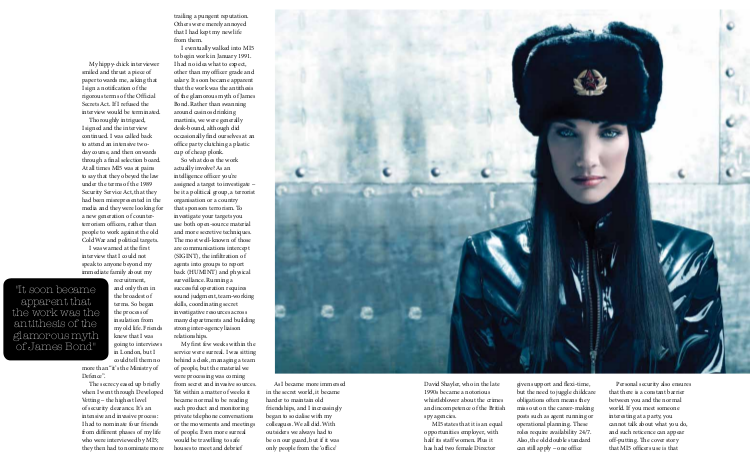I was recently invited to write an article for the Nat West Business Sense online magazine about the potential value and benefits of whistleblowers. Here’s the link, and here’s the article:
The controversial issue of whistleblowing has been firmly thrust into the public consciousness over the last few years with the ongoing saga of Wikileaks.
Often whistleblowers can get a bad rap in the media, deemed to be traitors, grasses or snitches. However, rather than a phenomenon to be feared, if handled correctly whistleblowers can often be beneficial to their organisations. Allow me to explain.
I have a nodding acquaintance with the process. In the 1990s I worked as an intelligence officer for the UK domestic Security Service, generally known as MI5, before resigning to help my former partner and colleague David Shayler blow the whistle on a catalogue of incompetence and crime. As a result we had to go on the run around Europe, lived in hiding and exile in France for 3 years, and saw our friends, family and journalists arrested around us. I was also arrested, although never charged, and David went to prison twice for exposing the crimes of the spies. It was a heavy price to pay.
However, it could all have been so different if the UK government had agreed to take his evidence of spy crimes, undertake to investigate them thoroughly, and apply the necessary reforms. This would have saved us a lot of heartache, and could potentially have improved the work of the spies. But the government’s instinctive response is always to protect the spies and prosecute the whistleblower, while the mistakes and crimes go uninvestigated and unresolved. Or even, it often appears, to reward the malefactors with promotions and gongs.
The draconian Official Secrets Act (1989) imposes a blanket ban on any disclosure whatsoever. As a result, we the citizens have to take it on trust that our spies work with integrity. There is no meaningful oversight and no accountability.
Many good people do indeed sign up to MI5, MI6 and GCHQ, as they want a job that can make a difference and potentially save lives. However, once on the inside they are told to keep quiet about any ethical concerns: “don’t rock the boat, and just follow orders”.
In such an environment there is no ventilation, no accountability and no staff federation, and this inevitably leads to a general consensus – a bullying “group think” mentality. This in turn can lead to mistakes being covered up rather than lessons learned, and then potentially down a dangerous moral slide.
As a result, over the last decade we have seen scandal heaped upon intelligence scandal, as the spies allowed their fake and politicised information to be used make a false case for an illegal war in Iraq; we have seen them descend into a spiral of extraordinary rendition (ie kidnapping) and torture, for which they are now being sued if not prosecuted; and we have seen that they facilitate dodgy deals in the desert with dictators.
But it is not all bleak. Recently, Dr Tom Fingar received The Sam Adams Award for Integrity in Intelligence in Oxford for his work on compiling the US National Intelligence Estimate of 2007. In this he summarised the conclusions of all 16 US intelligence agencies by saying that Iran had ceased trying to develop a nuclear weapons capability in 2003.
There was immense political pressure on him to suppress this evidence, but he went ahead with the report and thereby single-handedly halted the US government’s rush to war with Iran. By having the courage to do his job with integrity, Dr Fingar is responsible for saving countless lives across Iran.
In the world of intelligence, where secrecy is paramount, where crimes can hushed up, and where there is no avenue for voicing concern and dissent, it is perhaps inevitable that whistleblowers will continue to emerge.
But in other sectors of work mistakes can be just as life threatening and the need for exposure just as great. In the UK over the last few years many senior medical whistleblowers have emerged from the NHS, detailing mistakes and incompetence that have put the public at risk. Alas, rather than learn from mistakes made, all too often NHS bosses have either victimised the whistleblowers by suspending them or ruining their reputation, or they have insisted that they sign gagging orders and then covered up the mistakes. Neither option is a good outcome either for staff morale or for patient safety.
While the culture of cover-up exists, so too will whistleblowers. How could this be resolved, and what would be the potential benefits?
If employers institute a culture of trust and accountability, where employees with concerns can be fairly heard, the appropriate action taken, and justice done, the needs and imperatives behind whistleblowing would disappear. Potential problems could be nipped in the bud, improving public trust and confidence in the probity of the organisation and avoiding all the bad publicity following a whistleblowing case.
Plus, of course, the potential whistleblowers would have a legitimate avenue to go down, rather than having to turn their lives inside out – they would no longer need to jeopardise their professional reputation and all that goes with it such as career, income, social standing and even, potentially their freedom.
Having a sound procedure in place to address staff concerns strikes me as a win-win scenario – for staff efficiency and morale, the organisation’s operational capability and reputation, and potentially the wider public, too.







